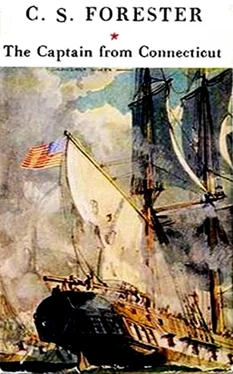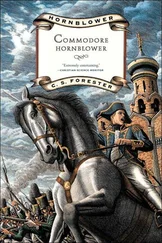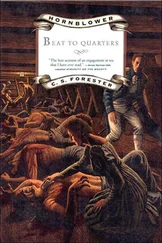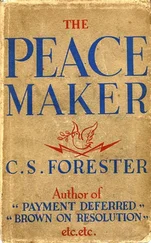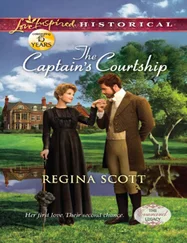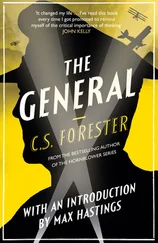The Captain from Connecticut by C. S. Forester
Although it was mid-afternoon it was nearly as dark as a summer night. The ship swayed uneasily at her anchor as the wind howled round her, the rigging giving out musical tones, from the deep bass of the shrouds to the high treble of the running rigging. Already the snow was thick enough on her to blur the outlines of the objects on the deck. On its forward side the square base of the binnacle was now a rounded mound; the flemished coils of the falls were now merely white cylinders. The officer of the watch stood shivering in the little shelter offered by the mizzen mast bitts, and forward across the snow-covered deck a few unhappy hands crouched vainly seeking shelter under the high bulwarks.
The two officers who emerged upon the quarterdeck held their hats on to their heads against the shrieking wind. The shorter, slighter one turned up the collar of his heavy coat, and attempted instinctively to pull the front of it tighter across his chest to keep out the penetrating air. As he spoke in the grey darkness he had to raise his voice to make himself heard, despite the confidential nature of what he was saying.
“It’s your best chance, Peabody.”
The other turned about, and stood to windward with the snow driving into his face before he answered with a single word.
“Aye,” he said.
“The glass is still dropping. But it can’t go much lower,” went on the other. It seemed as if he were talking for the purpose of encouraging himself, not the man he was speaking to. “The west wind’ll veer nor’-easterly to-morrow, but by that time you’ll have weathered Montauk, please God.”
“Please God,” echoed Peabody—but it was more like a prayer, in the tone he employed, than the other man’s speech.
“Well, good-bye, then. The best of good fortune, Captain Peabody.”
The two men shook hands in their heavy furred gloves. Peabody raised his voice against the storm—it was a penetrating voice, nasal yet with a tenor musical tone which somehow made it more readily audible against the wind.
“Call the Commodore’s gig. Pipe the side for the Commodore,” he said.
“Compliments in this weather?” asked the Commodore, a little surprised, but Peabody gave him no explanation. He was not going to allow a blizzard to interfere with the decent and proper routine of his ship.
The figures huddling for shelter under the bulwark came to life and scuttled across the deck and down into the gig. Other figures, black against the snowy deck, came swarming up from below. It was strange and unnatural that their feet made no sound on the deck. They were like ghosts in their noiselessness, treading the thick carpet of snow. Not even the marines, in their heavy shoes, made any sound. Feebly the pipes of the boatswain’s mates twittered in the shrieking wind as the Commodore went over the side down into his waiting gig. Peabody watched him down to the boat, saw the bowman cast off the painter, and then turned back to face the wind again.
“Man the capstan, there!” he shouted. “Mr. Hubbard, fore and main topmast staysails. Three reefs in the tops’ls, ready to sheet home.”
He stood with his hands behind him, facing into the bitter wind, and making no attempt whatever to shelter from it. Forward he could just hear the voice of the boatswain as he gave the word to the men at the capstan bars. Then he heard the clank-clank of the capstan; it was turning slowly—very slowly. It was hard work to drag the big frigate up to the anchor against the wind. There were men aloft, too; their movements disturbed the snow banked against the rigging, and it was drifting astern in big puffs visible through the snow. Another unexpected noise puzzled Peabody for a moment—it was the crackling of the frozen canvas as it was unrolled. And the frozen ropes crackled, too, like a whole succession of pistol shots, as they ran through the sheaves. Little lumps of ice stripped from them came raining down about him, whirled aft by the wind.
Peabody looked over the starboard quarter. Somewhere in that murk and darkness was the Long Island shore, and Willet’s Point, too near to be pleasant, he knew, although invisible. On the larboard bow, equally invisible, lay Throg’s Neck. It was only the protection of the guns of Fort Totten and Fort Schuyler on these two points which had enabled him to bring his ship thus far in peace. Beyond them the British Navy cruised unchallenged over the length and breadth of Long Island Sound, yet the watch over the Narrows was stricter still, so strict that in his considered judgment it had been better to make the attempt to reach the open sea by this back door to New York. Were it not for the land batteries the Hudson and Hell Gate would be at the mercy of the British squadrons, just as Long Island Sound was. Hardy—the captain who had kissed the dying Nelson in the cockpit of the Victory at Trafalgar—lorded it off New London in the Ramillies, burning fishing boats and capturing coasters, and keeping Decatur and Jones blockaded in the port. Peabody thought of the starving seamen and dockyard hands who begged their bread on the waterfronts of New York and Baltimore, of the ruined businesses and the disrupted national economy. Hardy and his brother captains were strangling the Union slowly but certainly. Whether the Delaware would help to break their stranglehold in the slightest was more than he could say. He could only carry out his orders, interpreting them as best he could towards that end. If necessary, he could die.
The gale bore back the boatswain’s hail from forward.
“Straight up and down, sir!”
“Heave away!” shouted Peabody. “Sheet home, Mr. Hubbard.”
There were two quartermasters at the wheel beside him; the spokes turned in their hands as the Delaware gathered sternway. The canvas slatted wildly as the yards were braced round.
“Hard a-starboard,” said Peabody.
The Delaware hesitated and trembled. Her sails filled with a loud report, and Peabody felt the movement of the deck under his feet as the Delaware lost her sternway and began to move forward. She was heeling now as the treble-reefed topsails caught the wind. So thickly was the snow driving that it was impossible to see what was happening. Peabody had to rely on his other senses, on the feel of the ship, on his long-trained instincts, to draw his conclusions about what she was doing.
“Keep her to the wind,” he said to the quartermasters. They, too, would have only their long experience to help them in their task. Only by the feel of the wind in their faces, and by the sound of the sails if they steered too close to the wind, could they tell whether they were obeying their orders or not.
Under pressure of the wind upon her scanty canvas the Delaware was moving forward precipitately through the water. The surface was rough enough to give her a distinct motion, and the sound of her bows crashing through the waves was audible through the noise of the wind. She was lying far over with the pressure of the wind, despite the fact that her top-gallant masts had been sent down; she was behaving like a blood horse in the hands of incompetent stable boys. No one save a madman or a blockaded captain would dream of taking a ship to sea in conditions like this, with a treacherous shore under her lee and snow so thick that it was hard to see a dozen fathoms away. But it was only in conditions like this that the Delaware stood any chance of evading the attention of Hardy and his watchdogs. She might as well, reflected Peabody bitterly, be piled up on the Long Island shore as lying rotting at Brooklyn.
He bent over the lighted binnacle, and studied the compass, and then turned his face back towards the snow while he made his calculations. His mind worked slowly but with infinite tenacity, and he had no need of paper and pencil as he moved mentally from point to point of the course he had in mind. They would weather Elm Point comfortably, he decided.
Читать дальше
